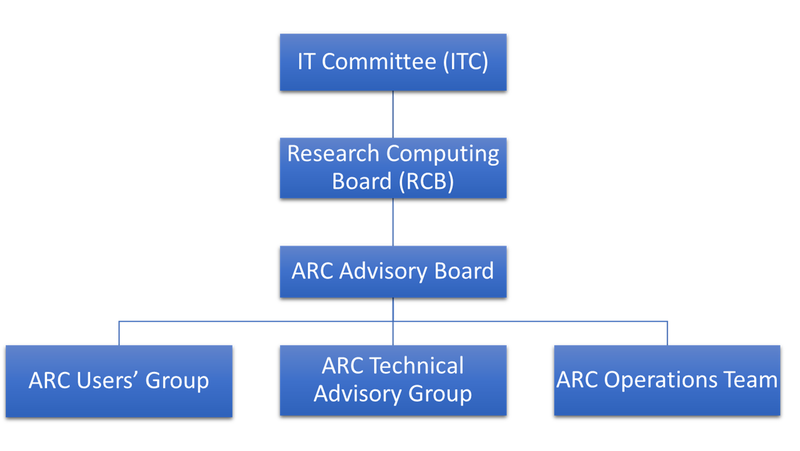Governance

ARC Governance
The following diagram summarises the ARC governance structure. For each identified element the respective terms of reference are provided below.

IT Services - Research Computing Board
Summary:
- The Research Computing Board (RCB) is responsible for oversight of the University Research Computing Strategy, its delivery, and that the resultant services meet the standards required to support computationally enabled research at a leading research-led University. The RCB reports directly to the IT Committee (ITC) and will work with the Research IT Board to ensure that its projects and activities align and complement those initiated by that group. RCB will also work closely with the other IT Boards within the University. Recognising the need to deliver projects and services through a federation of Research Computing providers the RCB will collaborate with and be advised by the management groups of existing providers such as the ARC, Big Data Institute, Physics, Wellcome Trust Centre for Human Genetics.
Frequency:
- At least once per term
Terms of Reference:
- The Terms of Reference for the Research Computing Board can be found along with the other IT Funding Boards here (requires SSO)
Chair:
- Prof. Brian Marsden (Nuffield Department of Medicine)
ARC Advisory Board
Summary:
- The ARC Advisory Board provides oversight and advice on the operations and development of the ARC service to ensure that the services it delivers are fit for purpose in supporting the computational research at the University. The Chair of the Board is a full member of the Research Computing Board.
Frequency:
- Termly and as required
Terms of Reference:
- Reviews, devises and provides advice on the ARC service strategy and alignment with the University IT Strategy;
- Reviews and provides advice on the day to day management of the ARC services;
- Identifies monitors and advises on new opportunities in HPC and advanced research computing based science;
- Identifies and advises on industrial collaborations;
- Monitors, considers and represents views of the ARC user community to the wider University and externally;
- Advises on the development and adoption of suitable fair share policies to provide optimum utilisation of ARC resources;
- Members act as champions for HPC and the ARC service with regard to gathering requirements for new and enhanced resources and supporting infrastructure;
Chair:
- Prof. Garrett Morris (Department of Statistics)
ARC Technical Advisory Group
Summary:
- Advises the ARC Advisory Board on research computing requirements arising from departments, act as a technology watch/futures panel for evolving technologies and architectures and engagement with the wider university HPC community(e.g. HPC-Special Interest Group) in this role.
Frequency:
- At least once per term, and as required
Terms of Reference:
- Gather departmental requirements for HPC and advanced research computing infrastructures to be provided by the ARC.
- Monitor and advise on technology developments, investigating new and novel technologies that could be of use to the ARC.
- Engage with the wider Research Computing providers community at the University through fora such as the HPC-SIG
- Assist in evaluating ARC procurements as required.
Chair:
- Dr Robert Esnouf (Biomedical Research Computing Centre)
ARC User Group
Summary:
- The User Group acts as a source of feedback on ARC operations and user experiences of the service. The User Group will also be used to elicit and consult on requests for service change and development such as future ARC systems and modes of operation.
Frequency:
- once per term, and as required by Executive Committee
Terms of Reference:
- Represent users from all departments that are using the ARC resources;
- Provide input to requirements and develop proposal for new capabilities and hardware refreshes for the ARC service to ensure that these are aligned with user needs;
- Provide feedback on current performance of ARC resources, ARC support and ARC training activities
- Provide input on departmental administration requirements for information needed from ARC
- Encourage uptake of HPC among non-traditional communities
Chair:
- Prof.Brian Marsden (Kennedy Institute for Research Informatics)
ARC Operations Group
Summary:
- Day to day operation of the ARC resources, provision of user support and user training.
Frequency:
- Meets weekly and reports via the ARC Technical Services' Lead to the Head of Research Computing and Support Services
Terms of Reference:
- Day to day operation of all ARC resources
- Provision of user support for all ARC resources
- Provision of user training for ARC resources
- Provision of outreach activities to the university and external community related to HPC and advanced research computing
- Provide reporting and service information for ARC resource as required by the Executive Committee
- Engagement in national and international HPC and advanced research computing activities as appropriate.
Chair:
- Dr Steven Young (Technical Services Lead - ARC Service)



